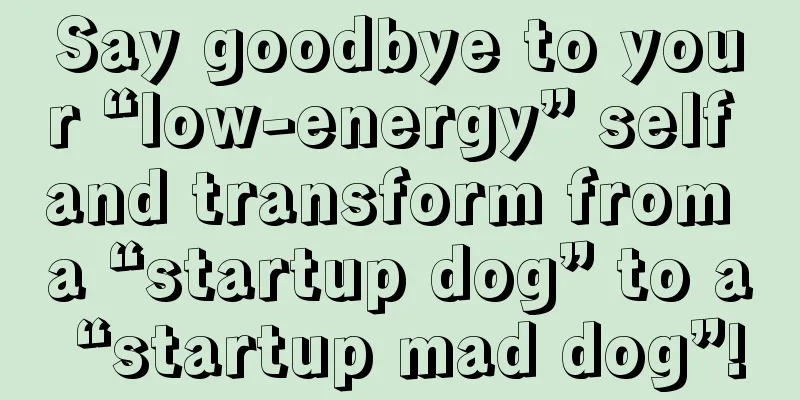Say goodbye to your “low-energy” self and transform from a “startup dog” to a “startup mad dog”!

My recent experience as an entrepreneur is that we must learn from top athletes. In their daily lives, athletes have sprints, training, and rest, so that they can adjust their status freely and face market competition with full energy. In my opinion, there are many similarities between athletes and entrepreneurs. Both face high-pressure environments and fierce competition. More importantly, neither athletes nor entrepreneurs can win by hard work alone. Athletes need to have “techniques and tactics”, study their opponents, study themselves, study their styles, study their psychology, study their physical fitness… so as to win the game. The same is true for entrepreneurship, which requires analysis of competition, market, and opportunity. After understanding this truth, I began to collect a lot of books on the so-called "energy management", but I felt that most of the content remained at the theoretical level and were useless when applied to real life, until I learned Deng Yaping's method. Deng Yaping has always been known for her strong mentality. She is not only the first real big devil of the Chinese women's table tennis team, winning gold medals at home and abroad, but she even obtained a doctorate in economics from Cambridge University after retiring, became a member of the Olympic Committee, and established a sports industry investment fund in Henan, becoming an investor... The biggest difference between top athletes and ordinary athletes is that top athletes can perform at their best at critical moments. I have summarized 7 methods for 7 emotional scenarios. They are not only suitable for "entrepreneurs" like me, but also for all "career dogs".
01 Before the breakdown: Design a small action to clear your mindThe first method is called thought blocking . In 1996, Deng Yaping made it to the finals of the Atlanta Olympics, where her opponent was Chen Jing from the Chinese Taipei team. At that time, the match was a best-of-five match. Facing her old rival, Deng Yaping was full of fighting spirit and quickly took the lead 2:0. But in this process, perhaps because Chen Jing had already fought to the death, she played with all her strength and quickly recovered 2 games. The situation became that Deng Yaping won 2 games in a row and then lost 2 games in a row. She and her opponent could only rely on the last game to decide the outcome. In such a high-pressure environment, how did Deng Yaping withstand the pressure and eventually win 3:2? She did a very interesting move: "Before each serve, she would press the serving board with her hands very attentively, once, twice, three times, and then start serving." This move helped her regain her best condition and establish a psychological advantage. The purpose behind this action is what we call "mind blocking." By touching the tee, she shifted her entire attention and physical state from the court to the touch of the tee, and from a high-pressure environment to a completely unrelated matter. Normally, when we are in a nervous state, we will give ourselves a psychological hint, telling ourselves "Don't be nervous, it's okay, I am very strong, I can get it back", but many times it doesn't work. Because the brain is difficult to deceive, and the brain reacts slowly to negative sentences. For example, when you are practicing driving in a driving school, there is a tree in front of you and the instructor tells you not to hit the tree, not to hit the tree, but you will be more likely to hit it. Because hitting a tree is the brain's first reaction, and not hitting a tree requires the brain to react a little longer. If the instructor is an experienced person, he will tell you very calmly to brake and turn right, giving you an affirmative sentence to let the brain react directly, instead of telling you not to do anything. The advantage of thought blocking is that when you have been thinking about one thing, by drawing your thoughts to something completely unrelated, your brain will be cleared for a period of time, and you will return to a quiet and empty state. This method sounds simple, but there are many key skills. Here are three: First, you use an action to provoke a reaction in yourself. When we are already caught up in a chaotic thought, and you use another thought to fight against this chaotic thought, the two thoughts will fight each other. New, positive thoughts do not have that much power to suppress those negative thoughts. But it’s different when you do an action. Action mobilizes your whole body, mind, and five senses. When your body moves, your brain doesn’t have time to think, and it can pull you out of your chaotic thoughts. Second, this action must be something you have practiced countless times before, and not something you improvise on the spot. For example, you use the wrist pressing action to remind yourself not to be nervous. This action is definitely not something you can do when you are very nervous, such as during an interview. It should be that when you are nervous in your daily life, you will habitually press your wrists and tell yourself that pressing can calm you down. After continuous practice, it will become your subconscious reaction, so that when you are nervous, pressing your wrists will work. Third, when doing the movements, you must be focused and focus all your attention on doing the movement. It is not enough to just do the movements without being physically and mentally engaged. Deng Yaping usually uses her palms to press and feel the touch of the table very attentively before pulling her attention back. In summary, whether it is a mental breakdown or an emotional breakdown, when you are about to collapse but know that you cannot collapse and must hold on, you can design an action to clear your mind. Remember, this method is called thought blocking. 02 When out of control: Make a list of failures to give your brain a sense of controlThe second method is called the failure list . At the 1996 Atlanta Olympics, why was Deng Yaping able to make a comeback when the score was 2:2? It was because she had failed in 1994. In the 1994 Asian Games, Deng Yaping played against Chirei Koyama, who changed her nationality and joined Japan. At that time, the national sentiment between China and Japan had not yet been enlightened. In the minds of the Chinese people, a Chinese person changing his nationality to Japanese was equivalent to a traitor. But in this game watched by the public, Deng Yaping lost. Because in the pre-match rehearsal, she did not expect Chirei Koyama to enter the finals. All her preparations were for Chen Jing of the Chinese Taipei team. Deng Yaping recalled that she lost calmly because there were no special mistakes. She hit the ball with full strength and played at her normal level, but Xiaoshan Zhili played like crazy and caught all her smashes. Deng Yaping's game is characterized by her strong first three smashes. But because she is short, she must attack constantly and defeat her opponent quickly, which consumes a lot of physical energy. After her opponent has survived the first three shots, her physical energy will decrease, and the opponent's physical energy will be crushed, so Deng Yaping loses the game. After experiencing this failure, she reflected that many unexpected situations in the competition are unpredictable. How can we make adequate preparations? Later, she proposed a method called the Failure List, which means that before going to a game, you should take out a piece of paper or a whiteboard and write down various situations in which you may fail. How will writing down such situations help you in future competitions? The answer is that when you write down these situations, you will build a sense of control over unexpected situations in advance. Because you have anticipated them before the game, even if you encounter unexpected situations, you will feel that you have "guessed them long ago", and your psychological advantage will return. But if you don't expect an unexpected situation, you may subconsciously feel that you are doomed, which will lead to panic. For a top athlete in a crucial game, psychological control is very important. Once you feel that the situation is out of control, your original confidence will collapse. This is not metaphysics. A scholar in the United States who specializes in studying stress conducted a very interesting experiment. He asked a group of students to write down the worst possible outcome of their interview on a small piece of paper before the interview and carry the paper with them to the interview. Finally, statistics show that those who have written a note and predicted the worst case scenario performed much better than those who did not write a note, because the failure list prediction on the note gave them a strong sense of control. This method is particularly common in the UKA era, when emergencies are constantly occurring. For example, the rise of AI is a huge challenge to all industries. It is hard to imagine that after a few years of AI development, banks will no longer need counters and bank employees will lose their jobs. Accountants who only count financial data will also face unemployment. Will AI robots drive cars in the future and drivers will no longer be needed? In this era of frequent accidents, it is particularly important to have a failure list. It can help you continuously build a sense of control over your life at every stage of your life, help you gain a strong psychological advantage, and act like a shield against future uncertainties. 03 When you are not confident: design a lucky ritual and use superstition to build confidenceThe third method is to use superstition to build self-confidence . The world's top athletes all have "superstitious" habits. Before every game, basketball god Michael Jordan would put on a pair of training pants from his school team inside his existing pants. In other words, he would wear two pairs of pants every time he played a game; tennis goddess Li Na would always book the same room in the same hotel every time she went abroad to play a game; Deng Yaping would always blow air into the table tennis ball every time she played a game; Yao Ming never shaved before a major game... Why do top athletes have such superstitious habits? Deng Yaping cited a sentence from teacher Wan Weigang: "So-called superstition is to find reason where there is no reason, to find meaning where there is no meaning, to find rules where there are no rules, and to impose cause and effect where there is no cause and effect." From a psychological perspective, the so-called "superstition" is essentially a search for a sense of self-control, reducing uncertainty through a sense of self-control. This habit is like a ritual that helps you create positive psychological cues. Just like when big directors make movies or TV series, they are used to worshipping before filming. This has become a tradition. In the past, before a tribe went out hunting, in order to ensure a smooth hunt, they also had to worship their totems and gods. The history of human development is full of various ritual behaviors. Ritual behavior itself is a kind of psychological suggestion, which gives us a sense of control over all uncertain things. In this way, athletes emphasize to themselves that all off-field factors are in their favor today and that no unexpected situations will affect me. By doing this, I will have great power. But the question is, what is the difference between this kind of daily superstition and the superstitious means adopted by athletes? For example, what is the difference between our worshipping gods, Buddhas, Guan Gong, and Mazu before a game and athletes wearing two pairs of training pants and staying in the same hotel and room? The biggest difference is that the athlete’s ritual leaves the sense of control to themselves, while the superstitious method of ordinary people leaves the sense of control to others. When you worship gods, Buddhas, Mazu, and heaven, you are actually asking them to give you something. But athletes use their own behavior to empower themselves, putting the right to choose entirely in their own hands, so they have a stronger sense of control. This method is also recommended to everyone, especially in scenes like "before major events" in life, such as when going to an interview, meeting important clients, meeting important investors, or when wanting to win a negotiation. You can build confidence for yourself through some ritualistic ways. Author: General Liang WeChat public account: General Liang |
<<: What should data analysts do when they are always faced with various difficulties?
Recommend
There's another wave of Children's Day? Adults fight with children for toys at KFC
Through the hot sales and consumer response of the...
With annual sales of 100 million cups and 30 million members, how does Shanghai Auntie achieve "high conversion" in the private domain?
This article starts with Shanghai Auntie, the &quo...
Detailed explanation of the whole process of user operation
This article mainly analyzes the whole process of ...
Instead of talking about the “big” reunion, it is better to focus on the “small” perfection in Mid-Autumn Festival marketing
As festival marketing continues to upgrade, how br...
What does Douyin want to do by guiding businesses to sell products not through live streaming or short videos?
"You don't need to broadcast or shoot sho...
With over 36 million members and an IPO on the horizon, how does Gu Ming, a brand with tens of thousands of stores, operate its private domain?
The continued growth of Gu Ming's performance ...
Just ask on WeChat, and you will find that we can’t handle the free traffic!
This article mainly talks about the WeChat Ask fun...
New Year's co-branded models: the undefeated Chinese style, the people-friendly cartoon style, which one do you pick?
The Spring Festival is a traditional festival that...
What is Shopee username? What is the purpose of Shopee sub-account?
Whether we want to shop on Shopee or open a store ...
In the last week of 2023, the “offline Pinduoduo” kicked off the knockout round
"Price power" is undoubtedly a keyword i...
Data drives business growth, real cases are here!
In the retail industry, how to increase the propor...
How to implement marketing plan if there is no money?
Are you having a headache with marketing? Is your ...
Can I open a personal store on Shopee? What are the conditions for opening a store?
Shopee is a well-known e-commerce platform that al...
Where is Amazon's customer service center? How do I access it?
Many people still have questions about the Amazon ...
An in-depth analysis of the warehouse membership store model to see the competitive cards of Costco, Sam's Club, Fudi and other players
Under the shadow of Sam's Club, which is a &qu...









